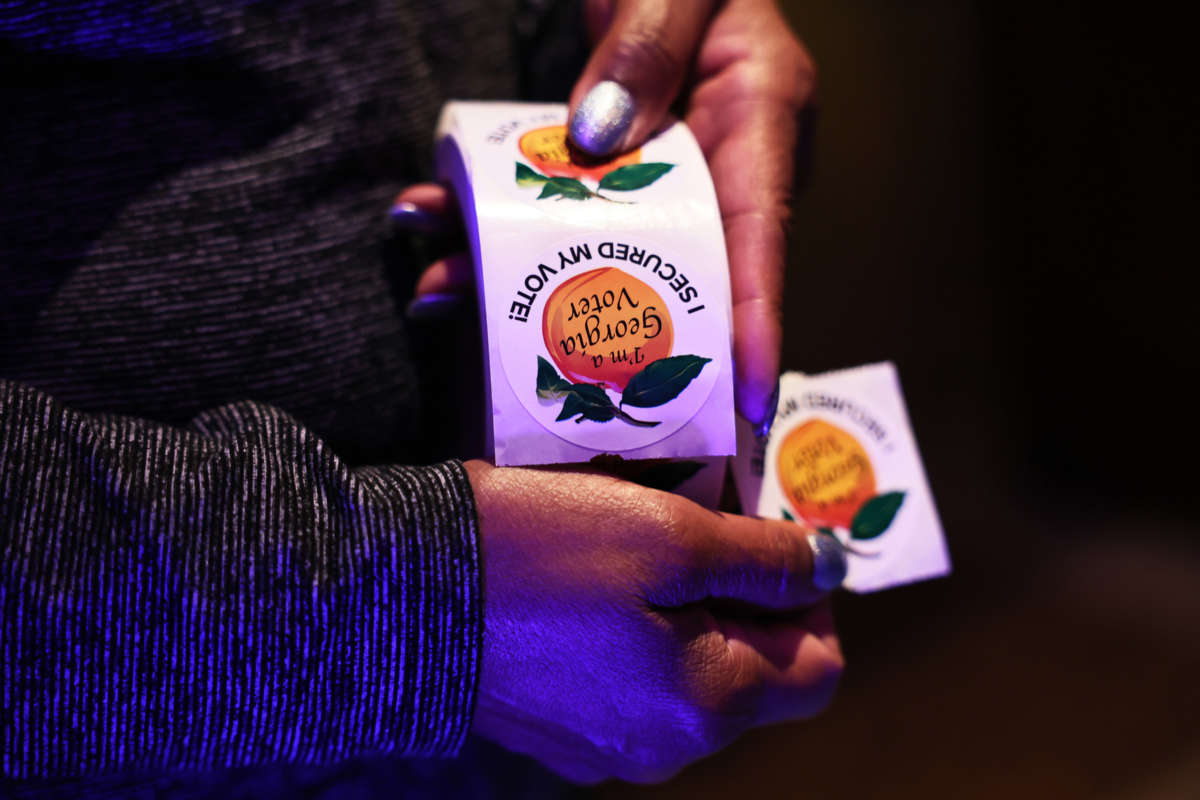Honest, paywall-free news is rare. Please support our boldly independent journalism with a donation of any size.
Georgia voters are slated to not be allowed to vote early on a Saturday before the upcoming U.S. Senate runoff due to voter suppression efforts by the GOP and the occurrence of Thanksgiving and a Confederate holiday in late November.
The runoff between Sen. Raphael Warnock (D) and Republican Herschel Walker will take place on December 6. Though the early voting window for the election could potentially encompass two weekends, Republican Secretary of State Brad Raffensperger’s office said that state law will not allow early voting on Saturday, November 26, despite saying last week that voters will likely have the opportunity to vote that day.
Raffensperger’s office sent out a memo on Saturday citing a Georgia law passed in 2016, claiming that it prohibits early voting on the second Saturday before the runoff because there is a state holiday immediately preceding it. The holidays, in this case, are Thanksgiving and a holiday commemorating Confederate general Robert E. Lee that Friday. Early voting on the weekend directly before the election is not allowed in the state.
The timing wasn’t an issue in previous runoff elections because runoffs used to take place nine weeks after Election Day. But after Republicans lost both Senate seats in the runoff election last year, the GOP-controlled legislature passed a massive voter suppression bill that shortened the timeline to a mere four weeks after Election Day, perhaps knowing that the holidays will typically coincide with at least part of the early voting window.
Voting rights advocates have said that Raffensperger’s office’s interpretation of the law is incorrect, however, and that the attempt to limit early voting is another GOP move to suppress the vote, especially since Democrats typically push early voting more than Republicans.
Marc E. Elias, founder of voting rights group Democracy Docket, pledged that the group would explore legal options to combat the Republican decision.
“The GOP is desperate to suppress the vote in the Georgia runoff. Last night, they tried to sneak out incorrect information regarding Saturday voting on Nov. 26,” Elias wrote on Twitter on Sunday. “This interpretation of the law is wrong. If Georgia insists on it, we will consider all legal options.”
Elias also pointed out that the timing of the memo disallowing Saturday voting was suspicious, as it came just as outlets began projecting that Democrats would maintain control of the Senate after the party was projected to keep its seat in Nevada.
Other voting rights and justice advocates pointed out that the fact that voting would be limited in part due to a holiday celebrating a Confederate general was especially symbolic of Republicans’ voter suppression efforts, which appear to have specifically targeted Black Georgians’ ability to vote.
“A Confederate holiday should not prevent the protection of democracy,” wrote Georgia National Association for the Advancement of Colored People (NAACP) President Gerald Griggs. “That holiday needs to be eliminated.”
The NAACP is also considering legal options over the GOP decision, as Griggs told The Atlanta Voice. The Georgia NAACP has sued the state several times over what they said were gerrymandered maps and over the state’s landmark voter suppression law last year.
Georgia State Rep. Jasmine Clark, a Democrat, said that the shortening of the voting window for the runoff only serves to further the GOP’s voter suppression efforts.
“There is no logical rationale to banning early voting on the Saturday after a Thursday or Friday holiday other than to limit the number of weekend days available for early voting in the runoff,” Clark said. The short window “makes Election administration extremely difficult, leaves zero room for things like recounts and other potential delays, and disenfranchises voters who would need to vote by mail.”
“And the icing on the cake is somehow the remnants of the confederacy always find a way to make an appearance,” Clark continued. “The fact that Robert E. Lee is the reason why the law bans Saturday voting this year is par for the course in Georgia’s ugly history of racism and voter disenfranchisement.”
Trump is silencing political dissent. We appeal for your support.
Progressive nonprofits are the latest target caught in Trump’s crosshairs. With the aim of eliminating political opposition, Trump and his sycophants are working to curb government funding, constrain private foundations, and even cut tax-exempt status from organizations he dislikes.
We’re concerned, because Truthout is not immune to such bad-faith attacks.
We can only resist Trump’s attacks by cultivating a strong base of support. The right-wing mediasphere is funded comfortably by billionaire owners and venture capitalist philanthropists. At Truthout, we have you.
Our fundraising campaign is over, but we fell a bit short and still need your help. Please take a meaningful action in the fight against authoritarianism: make a one-time or monthly donation to Truthout. If you have the means, please dig deep.
